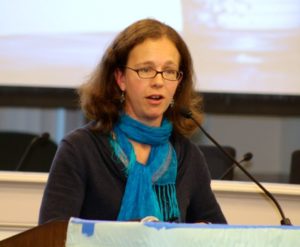HYANNIS – Research scientists with the Silent Spring Institute provided an update Wednesday at Barnstable Town Hall in Hyannis on studies involving highly fluorinated chemicals in local waters.
A new study with the Center for Coastal Studies is testing for pharmaceuticals and highly fluorinated chemicals, or PFASs, in coastal waters, according to Laurel Schaider, a Silent Spring researcher.
“We’ve found that in areas with greater septic system impact these are chemicals that are more likely to show up,” said Dr. Laurel Schaider, a Silent Spring research scientist. “And this is of concern both for ecological health and for understanding effects on drinking water quality as well.”
So far scientists have collected data on the levels of highly fluorinated chemicals and pharmaceuticals in water samples after testing 10 tidal creeks in Cape Cod Bay.
“We’ll be getting new data in the next few months from passive samplers,” Schaider said. “So these provide integrated measures of water concentrations over time and may give us a better sense of the levels of chemicals that might be taken up by organisms.”
Another research center, which is a partnership between the institute, Harvard University and the University of Rhode Island, focuses on PFASs, and how to better measure the chemicals, understand how they move through the environment, how people can be exposed and what health effects they may have.
“Some of the research will be happening right here on the Cape and we’ll have active discussions throughout the whole project to bring together Cape residents, town officials and members of the study team.”
The STEEP project is funded by the National Institute of Environmental Health Sciences Superfund Research Program.
Residents on the Cape will have a chance to meet the team who will work on the project during an event on December 4.
Epidemiologist Julia Udesky also provided an update to a study published by Silent Spring in 2007 on the link between environmental chemicals and breast cancer.
Since that publication, hundreds of similar studies have been published on the subject over the last 10 years.
A critical review of all the studies was conducted and evidence suggests that exposure to chemicals early in life, in the womb, during puberty and through pregnancy, is an important risk factor for the development of breast cancer later in life.
The findings of the review could help to inform prevention efforts which look to reduce rate of the disease by reducing exposure to hazardous chemicals.
Cape Cod has one of the highest rates of breast cancer in the state.
By BRIAN MERCHANT, CapeCod.com NewsCenter

























